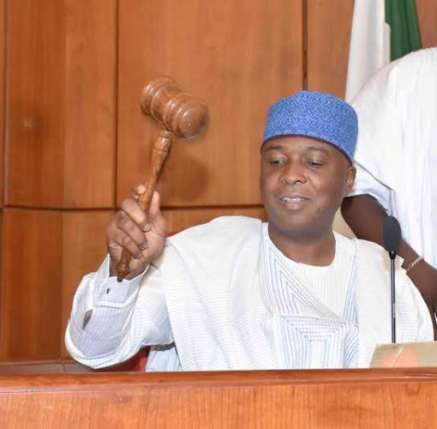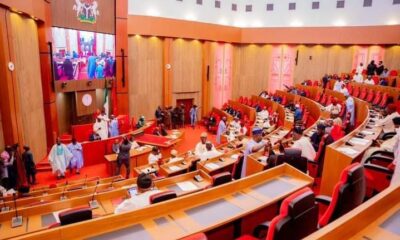Finance
Nigeria’s Missing budget: Senate sets up search c’ttee

ABUJA — NIGERIA’s Senate President, Dr Bukola Saraki, has admited that the 2016 budget was missing from the National Assembly, when he openly said a search committee set up by the Senate for the missing document would present its report today.
Saraki’s confirmation of the report came just as Vanguard gathered that the search committee quizzed aides of President Muhammadu Buhari in the National Assembly as well as staff of the offices of the clerks to the Senate and House of Representatives, yesterday.
Vanguard sources said those interrogated gave useful information to the committee which would be presented to the Senate in plenary today.
The Senate President, who had earlier at the beginning of Senate’s session, yesterday, announced to senators that copies of the 2016 budget document would be made available to them today, in readiness for general debate on it next Tuesday, eventually owned up on the missing document while responding to Senator Abaribe’s point of order.
Abaribe had, through Order 42(1) of the Senate standing rule, drawn the attention of the Red Chamber to media reports that the budget document was missing and called for immediate deliberation on it by pointedly asking the Senate President: “where is our budget?”
He said: “The matter that I refer to through this order, is what is in every newspaper today, everywhere in all the talkshows in the radio of a missing budget and therefore Mr President, I want to bring to your attention and that of all my colleagues that yesterday ( Tuesday) in our closed door session, this matter also came up and some of us who are worried, who have been inundated by messages from our constituents who are really worried about what their fate will be in 2016, are asking us, where is our budget.
“That is why Mr President, I think, it is definite and it is urgent that we look into this matter of missing budget now.”
Abaribe’s submission pushed Saraki to admit that the budget document was not in sight in the Senate, contrary to the earlier denial of the Senate that the document was missing.
Saraki did not only confirm that the issue was raised and discussed at the Senate closed door session on Tuesday but also said a search team had been set up to look for the missing document.
Search c’ttee to submit report today
Saraki added in his response that the search committee set up on the missing budget is expected to file in its report today, which according to him, would help in ending the quagmire.
He said: “Because of the importance of this matter raised through your point of order, I will take it as an exception in not ruling you out of order.
“You know we were all part of the decision at the closed session yesterday (Tuesday), and as part of that decision, we are still waiting for those we have referred to carry out the assignment to come back to us.
“I think they will come back to us by tomorrow (today) and we will go into a closed session again and finish up the report and we will be able to debate it properly.”
Anyanwu, Nwaoboshi, Ndume differ
Speaking to journalists after Senate plenary, yesterday, on the controversy, Chairman of the Senate Committee on Ethics and Privileges, Senator Sam Anyanwu (PDP, Imo East), confirmed that the search committee had already swung into action at unraveling circumstances that led to the missing budget.
According to him, ”the committee has as at this morning queried some people suspected to be involved in the missing document.”
He, however, added that the committee as disclosed by the Senate President at plenary, would turn in its report to the Senate today for deliberation.
Also, a member of the committee, Peter Nwaoboshi (PDP, Delta North), confirmed that the budget document was missing and the committee was investigating it.
He said: “The document is missing. We want to find out. We have interviewed some people so far this morning. We are continuing in the next few minutes with out investigation. And we are almost at it. We will conclude in the next few hours because we have already known what is happening.”
However, the Senate Leader, Ali Ndume, in his reaction, insisted that the document was not missing and that it would be distributed to senators today for commencement of general debate on it next Tuesday.
Vanguard-
Business
Nigeria pays US$4.9 billion on petrol subsidy in 2024- NNPCL
It was however noted by Biztellers.com.ng, that although subsidy is back in effect, the main reason for that is the increasingly weak state of the Naira and the country’s extreme dependence on products importation. Also unlike the previous subsidy era, where several oil marketers were getting free subsidy refunds for unverified product importation, this subsidy era is witnessing only one importer, the NNPCL, which in effect is the sole receiver of government subsidies.
Yemie ADEOYE
INSPITE of the official position of the Nigerian government that the controversial petrol subsidy is gone for good as announced by the President on assumption of office, the state owned Nigerian National Petroleum Corporation Limited, NNPCL has disclosed that petrol subsidy is still fully operational in Nigeria, although, under a different identity.
Umar Ajiya, Chief Financial Officer at the NNPCL, disclosed that it cost the company a staggering N7.8 trillion (US$4.9) to cover this price gap in the first seven months of 2024.
Rather than simply referring to these claims as subsidies, he stated that the company is merely managing the price difference in petrol imports on behalf of the federation, stressing that this should not be misconstrued as a return to subsidy payments.
![]() This revelation has reignited discussions on whether the NNPC is indirectly offering subsidies, a concept typically defined as selling a product below its cost price.
This revelation has reignited discussions on whether the NNPC is indirectly offering subsidies, a concept typically defined as selling a product below its cost price.
Documents reviewed by Biztellers.com.ng showed that the term “subsidy” was used extensively in official correspondence between the NNPCL and the presidency, particularly in reference to the “shortfall.”
Recall that President Bola Tinubu reportedly approved NNPC’s request to utilize the 2023 final dividends due to the federation to offset these costs.
However, during a media briefing on Monday about the company’s 2023 audited financial statements, Ajiya refuted claims that the NNPC is involved in any subsidy scheme.
Ajiya further disclosed that the Nigerian government owes the NNPC N7.8 trillion ($4.9 billion) in subsidy-related debts for the period from January to July 2024.
In furtherance of his clarification to the News Agency of Nigeria (NAN), Ajiya insisted that no subsidy payments have been made to any marketer in the last nine years, citing the NNPC’s role as the sole importer of petrol under supply contracts.
He said, “In the last eight to nine years, NNPC Ltd. has not paid anyone a dime as a subsidy; no kobo has been disbursed by NNPC Ltd. in the name of subsidy. No marketer has received any payment from us for subsidy.”
“What has been happening is that we have been importing PMS, which has been landing at a specific cost price, and the government tells us to sell it at half price. So the difference between the landing price and that half price is a shortfall.
“And the deal is between the Federation and NNPC Ltd., to reconcile, sometimes they give us money, so there is no money exchanging hands with any marketer in the name of subsidy.”
Ajiya remained silent on how much of the $4.9 billion could have been remitted to the federation account if the NNPC had not been covering the “shortfall.”
It was however noted by Biztellers.com.ng, that although subsidy is back in effect, the main reason for that is the increasingly weak state of the Naira and the country’s extreme dependence on products importation. Also unlike the previous subsidy era, where several oil marketers were getting free subsidy refunds for unverified product importation, this subsidy era is witnessing only one importer, the NNPCL, which in effect is the sole receiver of government subsidies.
Banking
CBN Denies Currency Devaluation

The Central Bank of Nigeria (CBN) has refuted claims of devaluing the.
Earlier reports suggested that the CBN had devalued the Naira, lowering its exchange rate from N631 to the dollar, compared to the previous day’s rate of N461.60 at the Importers and Exporters (I&E) window.
However, the Central Bank of Nigeria (CBN) released a statement on Thursday through its Acting Head of Corporate Communications, Dr. Isa Abdulmumin, categorizing the report as false information.
In the statement titled ‘CBN Has Not Devalued The Naira’, he said the attention of the apex bank was drawn to the news report by an Abuja based newspaper edition of June 1, 2023, titled “CB Devalues Naira To 630/51”.
However, the CBN stated categorically that the news report was replete with outright FALSEHOODS and destabilizing innuendos, ‘reflecting potentially willful ignorance of the said medium as to the workings of the Nigerian Foreign Exchange Market.’
“For the avoidance of doubt, the exchange rate at the Investors’ & Exporters (I&E) window traded this morning (June 1, 2023) at N465/USS1 and has been stable around this rate for a while.
“The public is hereby advised to ignore the news report by Daily Trust in its entirety, as it is speculative and calculated at causing panic in the market,” the CBN spokesman added.
He, therefore, advised media practitioners to verify their facts from the Central Bank of Nigeria before publishing in order not to misinform the public.
Banking
BREAKING: CBN Increases Interest Rate By 0.5%

The interest rate in Nigeria has been raised to 18.5 percent, up by 0.5 percent, from 18 percent where it was pegged in March 2023.
The Central Banks of Nigeria’s (CBN) Monetary Policy Committee (MPC) resolved to this effect at its third meeting of 2023 in Abuja, on Wednesday.
Governor, CBN, Godwin Emefiele, made the disclosure in the communiqué of the MPC’s meeting, thereafter.
While engaging the media at the end of the two-day meeting, Emefiele, said the committee voted to keep the asymmetric corridor at +100 and -700 basis points around the MPR.
In the view of the MPC, rising inflation rate is traceable to the high energy cost and challenges around the supply chain, among others, which lie outside the corridors of the CBN.
Emefiele said, “The current trend in price development would continue to be monitored by the bank with greater collaboration with fiscal authority to address the drivers of inflation.”
Biztellers reports that the CBN had effected six consecutive interest rate increases, which has seen the rate move from 11.5 percent in March 2022 to 18.5 percent in May 2023.



















